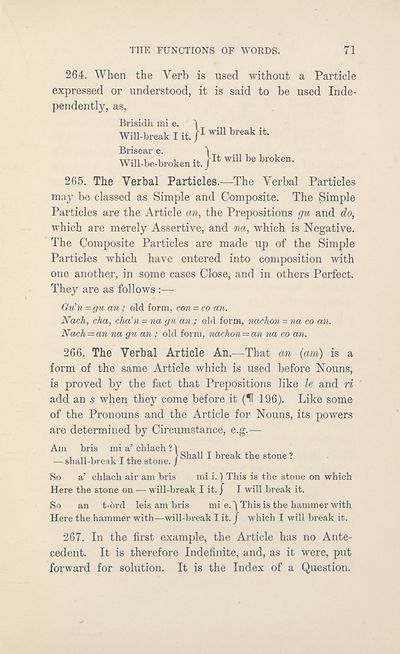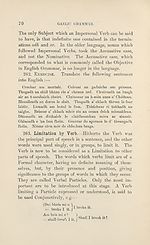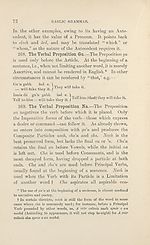Download files
Complete book:
Individual page:
Thumbnail gallery: Grid view | List view

THE FUNCTIONS OF WORDS.
71
264. When the Verb is used without a Particle
expressed or understood, it is said to be used Inde¬
pendently, as,
Brisidh mi e. \
Will-break I it./1 break it.
Brisear e. )
Will-be-broken it.)14 wlU be broken-
265. The Verbal Particles.—The Verbal Particles
may be classed as Simple and Composite. The {Simple
Particles are the Article an, the Prepositions gu and do,
which are merely Assertive, and na, which is Negative.
The Composite Particles are made up of the Simple
Particles which have entered into composition with
one another, in some cases Close, and in others Perfect.
They are as follows:—
Gu’n = gu an ; old form, con = co an.
Nach, cha, cha'n = na gu an ; old form, naehon = na co an.
Nach = an na gu an ; old form, nachon=an na co an.
266. The Verbal Article An.—That an (am) is a
form of the same Article which is used before Nouns,
is proved by the fact that Prepositions like le and ri
add an s when they come before it (If 196). Like some
of the Pronouns and the Article for Nouns, its powers
are determined by Circumstance, e.g.—
Am bris mi a’ cblach ?1
— shall-break I the stone, j
\ Shall I break the stone ?
So a’ chlach air am bris mi i.) This is the stone on which
Here the stone on —- will-break I it. j I will break it.
So an t-6rd leis am bris mi e. I This is the hammer with
Here the hammer with—will-break I it. / which I will break it.
267. In the first example, the Article has no Ante¬
cedent. It is therefore Indefinite, and, as it were, put
forward for solution. It is the Index of a Question.
71
264. When the Verb is used without a Particle
expressed or understood, it is said to be used Inde¬
pendently, as,
Brisidh mi e. \
Will-break I it./1 break it.
Brisear e. )
Will-be-broken it.)14 wlU be broken-
265. The Verbal Particles.—The Verbal Particles
may be classed as Simple and Composite. The {Simple
Particles are the Article an, the Prepositions gu and do,
which are merely Assertive, and na, which is Negative.
The Composite Particles are made up of the Simple
Particles which have entered into composition with
one another, in some cases Close, and in others Perfect.
They are as follows:—
Gu’n = gu an ; old form, con = co an.
Nach, cha, cha'n = na gu an ; old form, naehon = na co an.
Nach = an na gu an ; old form, nachon=an na co an.
266. The Verbal Article An.—That an (am) is a
form of the same Article which is used before Nouns,
is proved by the fact that Prepositions like le and ri
add an s when they come before it (If 196). Like some
of the Pronouns and the Article for Nouns, its powers
are determined by Circumstance, e.g.—
Am bris mi a’ cblach ?1
— shall-break I the stone, j
\ Shall I break the stone ?
So a’ chlach air am bris mi i.) This is the stone on which
Here the stone on —- will-break I it. j I will break it.
So an t-6rd leis am bris mi e. I This is the hammer with
Here the hammer with—will-break I it. / which I will break it.
267. In the first example, the Article has no Ante¬
cedent. It is therefore Indefinite, and, as it were, put
forward for solution. It is the Index of a Question.
Set display mode to:
![]() Universal Viewer |
Universal Viewer | ![]() Mirador |
Large image | Transcription
Mirador |
Large image | Transcription
| An Comunn Gàidhealach > An Comunn Gàidhealach Publications > Scottish Gaelic as a specific subject > (75) |
|---|
| Permanent URL | https://digital.nls.uk/125955917 |
|---|
| Description | This contains items published by An Comunn, which are not specifically Mòd-related. It includes journals, annual reports and corporate documents, policy statements, educational resources and published plays and literature. It is arranged alphabetically by title. |
|---|
| Description | A collection of over 400 items published by An Comunn Gàidhealach, the organisation which promotes Gaelic language and culture and organises the Royal National Mòd. Dating from 1891 up to the present day, the collection includes journals and newspapers, annual reports, educational materials, national Mòd programmes, published Mòd literature and music. |
|---|---|
| Additional NLS resources: |
|

